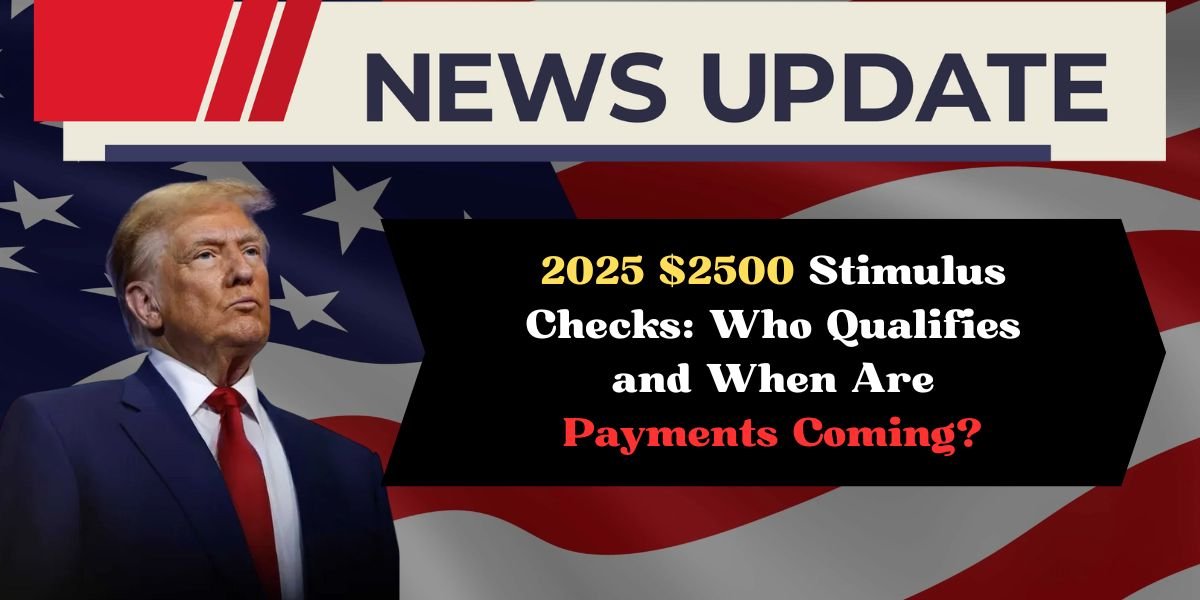With inflation still affecting American households and cost-of-living issues mounting, viral gossip about a $2,500 stimulus check has appeared over the past few days across social media platforms. Direct payment has made people optimistic—but confused too. The federal government has assisted its citizens during times of financial downtrend before, but official announcement of such payment in May 2025 has yet to be done.
Here is what’s fact, fiction, and what Americans can realistically hope for from these reports:
$2,500 Stimulus Check in 2025: Fact or Fiction?
The highly discussed $2,500 stimulus check has no legislative backing or word from the government so far. While many online and social media posts claim checks are on the way, the IRS and U.S. Treasury Department have made no announcements regarding any such checks.
This misinformation seems to be drawn from proposals and policy discussions, not from programs that have been implemented. These proposals usually arise in economic discussions but must be passed by Congress before they can be actual programs that release funds.
IRS $2,500 Stimulus Check Overview
| Category | Details |
|---|---|
| Program Name | “DOGE” Stimulus Proposal (unconfirmed) |
| Managing Agency | Internal Revenue Service (IRS) |
| Proposed Amount | $2,500 |
| Status | Not Approved |
| Eligibility Criteria | Based on income, tax filing, dependents |
| Official Websites | irs.gov, usa.gov |
How Did the $2,500 Stimulus Rumor Start?
Stimulus payment rumors tend to begin with policy proposals by Congressional members or web speculation. Here, groups made economic relief suggestions due to ongoing inflation. The suggestion was that low-income families and fixed-income individuals would be helped to deal with rising costs.
These suggestions have not been legislated into law. That is to say, no checks will be sent unless new legislation is passed and signed by the President.
Eligibility Requirements — If the Check Were Authorized
Should there be an eventual authorization of a $2,500 stimulus program, it would most likely follow past federal assistance programs. From past models, likely eligibility requirements would be:
- Income Levels: Individuals with incomes under $75,000 or couples with incomes under $150,000.
- Dependent Credits: Additional funds for individuals with qualifying dependents or children.
- SSI/SSDI Beneficiaries: Individuals on federal programs like Disability or Social Security might also qualify.
- Tax Return Requirement: The applicants would likely be required to file their federal tax return if they were to get any money.
But again, this isn’t actually in place yet—this is all just speculation based on past stimulus packages.

Why These Rumors Are Harmful
The majority of citizens, especially the poor and pensioners, may start to adjust their budgets around these unofficial payments. This subjects them to:
- Financial disappointment
- Phishing and online fraud
- Spurious third-party websites asking for personal information
Always remember: The IRS will never ask for banking or Social Security information through email, text messages, or phone calls. If a check ever were mailed, it would be processed automatically for eligible individuals—with no fee and no disclosure of personal information other than that which has already been reported to the IRS.
Stay Safe and Informed
Not to be a victim of scams or false promise, do the following:
- Do not follow suspicious links on email or social media.
- Never provide your information to unverified sources.
- Follow only official government websites:
Should a new payment be confirmed, these sites will have full, up-to-date information on eligibility, payment dates, and claiming benefits (if applicable).
What About Other Stimulus or Tax Benefits?
While a $2,500 federal stimulus check is not confirmed, other programs may offer assistance:
- Increased Child Tax Credits
- Earned Income Tax Credit (EITC)
- State-level stimulus programs or rebates
Some states, such as New Mexico and California, have established their own inflation rebates or guaranteed income initiatives. These are geographically- and income-dependent, and could possibly still be active in 2025.
While the rumor of a $2,500 stimulus is intriguing, it is still unverified and unsupported in law. Official sources are the only ones who should provide information on money assistance programs to Americans. Relief from the government may be introduced in case economic conditions continue to decline, but up to that time, no such payment is promised or planned for May 2025.
FAQs:
Q. Is the $2,500 stimulus check approved?
No, the federal government has not approved or confirmed any $2,500 stimulus payments for May 2025.
Q. Who would be eligible if the check is approved?
Low- and middle-income individuals, SSI/SSDI recipients, and dependent families—pending congressional approval and program specifics.
Q. Where can I check official updates?
Check irs.gov or usa.gov for the latest confirmed facts.






